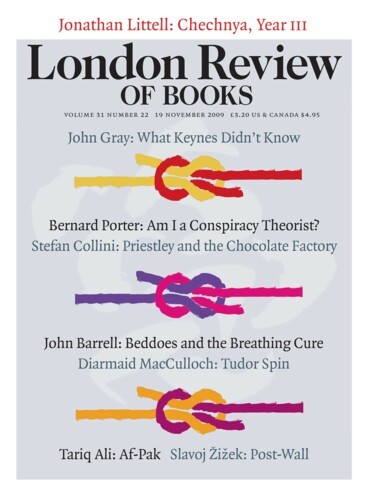When my friends and I were young and awed by David Foster Wallace (whose papers were recently acquired by the ultra-acquisitive Harry Ransom Center) we saw the author’s ever-present head scarf as a sort of tourniquet: it keeps his brains in, we thought. We were joking, of course. We didn’t know how tortured he really was. Wallace’s terminal self-consciousness seemed to us to be symptomatic of the times. If anyone had the intelligence and stamina to point the way out of our post-postmodern labyrinth, it was him. And, for a while at least, Wallace seemed willing and able to shoulder the burden. ‘For me, the past few years of the postmodern era have seemed a bit like the way you feel when you’re in high school and your parents go on a trip, and you throw a party,’ he said in 1993, in a long interview with the Review of Contemporary Fiction:
Alex Abramovich
Alex Abramovich is writing a book about the history of American music.
Twenty-one years ago in the LRB, Julian Barnes accused J.D. Salinger’s erstwhile biographer, Ian Hamilton, of ‘reverse reductivism’: ‘Normally, the biographer establishes the course of a writer’s life and then uses it to “explain” the work,’ Barnes wrote. With Salinger’s life largely unavailable, or where available obscure, Hamilton finds himself doing the opposite: deducing the life from the work
Earlier this week, three of the Velvet Underground’s surviving members gathered for a moderated panel discussion at the main branch of the New York Public Library. The band’s fans formed a long and winding queue along the building’s stairs; Andy Warhol’s amanuensis, Billy Name, who looks a bit like Santa Claus now, held court at the head of the line. To passers-by, it must have looked like Christmas on 42nd Street. The occasion itself was a bit of a miracle: For one thing, the moderator was a journalist – and anyone with opposable thumbs can tell you that Lou Reed, who doesn’t care for journalists, takes evident pleasure in his venomous and/or monosyllabic replies to their questions. (‘Journalists are morons, idiots,’ he’s said. ‘You can hit them, stab them, kick them in the shins, abuse them and outrage them and they won’t even notice.’ Click here and here to compare Reed’s style, as an interview subject, to Warhol’s.)
It’s strange to find the New York Times Book Reviewdevoting three full pages to yet another round of the Gordon Lish/Raymond Carver spat, previously addressed (at length) in, for example, The New Yorker, Slate and the New York Times’s own Sunday magazine. Stranger still to see it come down so heavily against Lish, one of the more accomplished editors of the 20th century. The byline is also odd: Stephen King – who was once praised (by the same publication) for his masterful reworking of the ‘evil-car motif’. Really? I don’t mean to pick on King.
Phenomenologically Fucked: Percival Everett
Alex Abramovich, 19 November 2009
I don’t believe in race. I believe there are people who will shoot me or hang me or cheat me and try to stop me because they do believe in race, because of my brown skin, curly hair, wide nose and slave ancestors. But that’s just the way it is.
Thelonius ‘Monk’ Ellison, in Percival Everett’s Erasure
Race is America’s most enduring fiction. And for all the
Podcasts & Videos
‘The categories are stupid’
Alex Abramovich and Thomas Jones
Alex Abramovich talks to Thomas Jones about the history of country from Jimmie Rodgers to Lil Nas X, by way of Dolly Parton (and Eddie Van Halen), and the problems with the labels that get applied to American
Read anywhere with the London Review of Books app, available now from the App Store for Apple devices, Google Play for Android devices and Amazon for your Kindle Fire.
Sign up to our newsletter
For highlights from the latest issue, our archive and the blog, as well as news, events and exclusive promotions.


